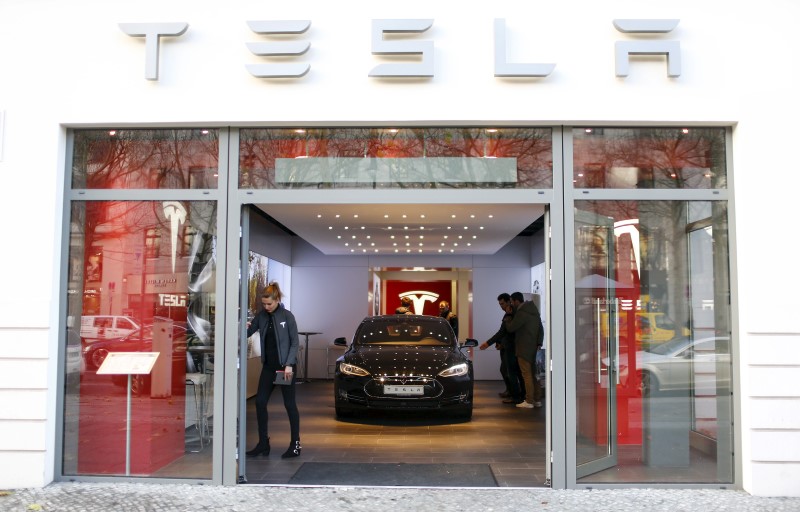(Reuters) – U.S. electric vehicle startups are turning to cheaper models, slamming the brakes on their production ramp-up plans and laying off employees to navigate a slump in demand due to steep borrowing costs and high repair expenses for the vehicles.
Tesla (NASDAQ:) has told suppliers it wants to start production of a new cheaper, mass market product in mid-2025, Reuters reported in January, as it looks to compete with cheaper gasoline-powered cars and inexpensive EVs from China.
Here’s how EV startups are trying to steer through the demand weakness:
RIVIAN AUTOMOTIVE
Rivian (NASDAQ:) on Thursday introduced its smaller, less expensive electric R2 SUVs and R3 crossovers with plans to start producing the R2 at its existing U.S. factory to hasten deliveries in the first half of 2026.
The move came weeks after the company said it was planning a weeks-long production shut down this year to upgrade its factories and cut costs.
The company expects to produce 57,000 vehicles in 2024, well below estimates of 81,700 units. That is also far below the estimated 1.8 million vehicles Tesla delivered in 2023.
After shying away from cutting the price of its vehicles last year, Rivian in February introduced lower-range options for its existing cars that are $3,100 cheaper.
The startup has focused on reducing its cash burn by re-negotiating supply contracts and building some components in-house. It ended the fourth quarter of 2023 with $9.37 billion in cash, cash equivalents, including short-term investments.
LUCID GROUP
Lucid (NASDAQ:), which has Saudi Arabia’s Public Investment Fund as its largest investor with a stake of more than 60%, has also forecast annual production that was widely below estimates as it looks to control cost.
The company has missed analysts’ expectations for revenue for six straight quarters. It has slashed the price of the Lucid Air Pure to $69,900 and is including two years of free scheduled maintenance and charging allowance as an incentive.
Lucid in November unveiled its Gravity SUV that will start under $80,000 and is expected to go into production late this year.
The company has said it aims to start producing a cheaper midsize vehicle in late 2026 to compete with Tesla’s Model 3 and Model Y vehicles, with a price point of around $50,000.
Lucid ended fourth quarter of 2023 with $1.369 billion in cash and cash equivalent.
FISKER
Fisker (NYSE:) issued a going-concern warning this month and said it would lay off 15% of its staff and pause investments on future projects until it secures partnership with a manufacturer.
Reuters has reported that Nissan (OTC:) is in advanced talks to invest in Fisker in a deal that could provide the Japanese automaker with access to an EV truck while giving the struggling startup a financial lifeline.
Demand has been weak for Fisker’s flagship Ocean electric SUV. Despite producing more than 10,000 vehicles in 2023, the company delivered only about 4,700.
The company ended 2023 with cash and cash equivalents of $325.5 million, down from $527.4 million as of Sept. 30,
NIKOLA
Nikola (NASDAQ:) is pivoting to big rigs powered by hydrogen, after some of its battery-electric trucks caught fire in August and forced a recall.
The company expects up to $170 million in truck revenue for 2024 with a target to sell 450 units this year, including its hydrogen fuel cell electric trucks.
Its cash balance stood at $464.7 million as of December-end, and the company has said it had the “the highest unrestricted cash balance” since the fourth quarter of 2021.
Read the full article here








